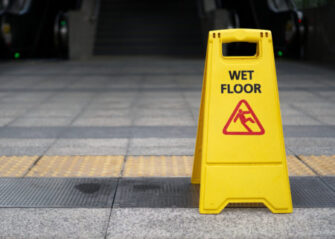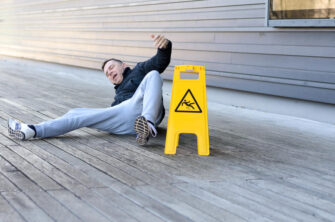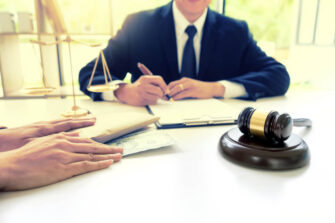Connect With A New York Slip And Fall Lawyer

People who have been injured or have loved ones who suffered wrongful deaths by slipping, tripping and falling because of the neglect on the part of a property owner or other responsible party (such as a business renting the space) are entitled to compensation for their injuries. New York City courts, as well as others throughout the state may hold negligent property owners liable for injury and require them to pay compensation for medical bills, future medical expenses and lost income.
New York Slip and Fall Lawyers Determine Negligence
Table of Contents
- 1 New York Slip and Fall Lawyers Determine Negligence
- 2 Frequently Asked Questions About New York Slip-and-Fall Accidents
- 2.1 Q: Do I have a case against the owner of a store where I fell and was seriously injured?
- 2.2 Q: How long do I have to file a lawsuit after a slip-and-fall injury?
- 2.3 Q: How long will it take to get money from my slip-and-fall claim?
- 2.4 Q: How much does it cost to hire an attorney in a slip-and-fall case?
- 2.5 Q: How much is my slip-and-fall claim worth?
- 2.6 Q: What are my options if I slipped and fell at work?
- 2.7 Q: What if I was partially at fault for my fall injury?
- 2.8 Q: What kind of compensation is available in a slip-and-fall case?
- 2.9 Q: What should I do if an insurance company offers me a slip-and-fall settlement?
- 2.10 Q: What should I do if I am seriously hurt in a slip-and-fall, and I know a problem there caused the accident?
- 3 Causes of Slip and Fall Injuries
- 4 Common Examples of What Is and Isn’t a Slip and Fall Case
- 5 Call Belluck & Fox, The Top-Rated Slip and Fall Lawyers in New York
- 6 What to Do If You are Injured in a Fall
- 7 What are the Stages of a Personal Injury Lawsuit?
- 8 Insurance Companies and NY Slip and Fall Accident Claims
- 9
- 10 Contact an Attorney at Belluck & Fox for a Free Consultation
While not all accidents are avoidable, property owners and their tenants are expected to take precautions to prevent injuries particularly when they have notice of the condition. They are also expected to make repairs in a timely manner.
Negligence is when an owner is aware of an unsafe situation, or should have been aware, and does not take action to address it. Examples include failing to maintain stairways with secure handrails, provide adequate lighting, anti-slip materials, making sure carpet is firmly in place without tears or bumps, and cleaning up spills. If a slippery floor or other unsafe conditions are neglected and someone is injured because of it, a premises liability case can and should be filed.
Frequently Asked Questions About New York Slip-and-Fall Accidents
Since the second you slipped and fell, your life has been tangled in a storm of medical treatment, pain, financial stress, and worry about the future. You’re constantly thinking about the cost of care, about losing money because you can’t work, about a thousand questions swirling in your head. The main thing you want to know is how to get some help from the individual or company responsible for your injury.
Let the New York personal injury attorneys at Belluck & Fox launch your fight for justice today. Schedule a free consultation with our dedicated attorneys so we can review the details of your case and help pursue full and fair compensation.
Some of the questions we frequently answer about slip-and-fall lawsuits are:
Q: Do I have a case against the owner of a store where I fell and was seriously injured?
A: Negligence on the part of the property owner, manager, or affiliated at-fault party is the foundation of a successful case. In order to prove negligence, we will need to show:
- You were on the property lawfully, or, if not, you were trespassing but the owner knew it.
- The property owner, manager, or affiliated at-fault party knew or should have known about the unsafe condition, yet nothing was done to correct it.
- That negligence resulted in your injury.
Q: How long do I have to file a lawsuit after a slip-and-fall injury?
A: New York state gives you three years from the time of the injury to file a claim, unless your claim is against the state, a county, or city. If you’re going after the government or one of its agencies, you must file a formal claim within 90 days. Then you have one year and 90 days from the time of the accident to file a lawsuit.
Q: How long will it take to get money from my slip-and-fall claim?
A: That depends on whether you have a solid case that a reasonable defendant wants to settle quickly or if you must deal with a combative defendant who chooses to go to court. There’s no set time, and deep-pocketed defendants and insurance companies may try to drag it out.
Q: How much does it cost to hire an attorney in a slip-and-fall case?
A: Belluck & Fox will take your case on a contingency fee basis. That means you do not pay us unless and until we secure compensation for you. Our initial consultation is free, so contact us now to get started.
Q: How much is my slip-and-fall claim worth?
A: There’s no way of saying upfront. It depends on your injuries and how they affect you. The goal is to thoroughly assess how this injury has affected you so we can demand maximum compensation.
Q: What are my options if I slipped and fell at work?
A: In many cases, New York state workplace injury rules limit employees to workers’ compensation when it comes to relief for medical expenses and lost wages. However, there are many circumstances under which you may have other legal options. For example:
- If your fall was caused by negligence on the part of a company other than your employer, you may be able to pursue compensation from that party. For example, if you fell on the stairs at your office building because the building manager ignored a spill.
- If defective or dangerous equipment led to your injury, the manufacturer or other companies in the chain of distribution may be held liable.
- Construction workers in particular are protected by the Scaffold Law, which allows them to pursue full and fair compensation for fall-related injuries.
Q: What if I was partially at fault for my fall injury?
A: New York is a pure comparative fault state. That means your compensation can be reduced if you were partially to blame. The court determines fault in percentages, so for example, if you were 30 percent at fault, your compensation would be reduced by 30 percent.
Q: What kind of compensation is available in a slip-and-fall case?
A: Depending on the circumstances of your case, we may demand compensation for:
- Existing and expected medical expenses
- Lost wages and reduced earning potential in the future
- Physical and emotional pain and suffering
- Punitive damages, which are levied as punishment in cases where the defendant is guilty of conscious or reckless disregard for the victim’s safety
Q: What should I do if an insurance company offers me a slip-and-fall settlement?
A: Do not agree to anything without talking to our experienced attorneys. Hard-nosed insurers will come at you with low-ball offers when you are at your most vulnerable right after the accident.
Q: What should I do if I am seriously hurt in a slip-and-fall, and I know a problem there caused the accident?
A: There are several steps you should take as soon as possible after a slip-and-fall accident to protect your rights to compensation:
- First get professional medical help.
- Notify the property owner and get a written record of your accident, but limit communication with potential defendants.
- Take photos and notes at the scene, and ask any witnesses for their names and contact information.
- Save any evidence, including the shoes and clothes you were wearing.
- Then contact us to discuss your legal options for pursuing the compensation you need.

Causes of Slip and Fall Injuries
- Wet or Uneven Surfaces with no warning signs
- Cluttered floors (Trash or debris on the floor)
- Loose floorboards, rugs, or mats, especially on stairs
- Defective sidewalks
- Parking lot potholes
- Torn carpeting
- Recently mopped or waxed floors
- Spilled liquids that are not cleaned up
- Splashed grease or oil that is not removed
- Ice that is not salted
- Bright light reflecting on a shiny floor that causes glare
- Poor lighting that makes it difficult to see obstacles
- Cords that a run across walkways
- Open desk or cabinet drawers
- Transitions from one type of surface to another, such as from carpet to wood
- Ladders and stairs, including:
- Poorly constructed staircases
- No handrail present or not using a handrail
- Rushing up and down or taking more than one step at a time
- Failure to secure a ladder or have someone hold it
Common Examples of What Is and Isn’t a Slip and Fall Case
 Slip and fall cases only arise if a property owner or agent created and/or ignored a dangerous condition. If the owner or agent was unaware of the condition, it can be more difficult to prove negligence. However, property owners and their employees are expected to stay apprised of the general condition of property used by the public.
Slip and fall cases only arise if a property owner or agent created and/or ignored a dangerous condition. If the owner or agent was unaware of the condition, it can be more difficult to prove negligence. However, property owners and their employees are expected to stay apprised of the general condition of property used by the public.
One common example is a grocery store where a product spilled off the shelf and onto the floor. Store employees, including managers, are expected to regularly check the aisles for such incidents. When one is identified, the normal process is to immediately put up warning signs to keep customers out of the area, and clean it up as soon as possible. If the cleaning leaves the floor wet, warning signs remain until the area is dry. Contact New York Slip and Fall Attorneys at Belluck & Fox for a Free Consultation
The skilled attorneys at Belluck & Fox have secured more than $1 billion in compensation for clients over the years, and we are here to answer any questions you have about compensation in your slip-and-fall case.
Contact us today to schedule a free consultation, and learn how we will fight for you.
Call Belluck & Fox, The Top-Rated Slip and Fall Lawyers in New York
- Established NYC injury law firm with more than two decades of experience handling slip and fall claims, and other injury cases
- Highly recommended by clients and legal peers
- Quality representation, unparalleled legal advice and compassionate customer service
What to Do If You are Injured in a Fall
 If you slip and fall, try to get witnesses’ contact information, including any police or ambulance responders who file accident reports. If you fall at someone’s business, let a manager know and s/he should complete an accident report. If you can, take a photo of the accident scene or ask a companion to do so. As soon as you can, write down what happened for your own notes.
If you slip and fall, try to get witnesses’ contact information, including any police or ambulance responders who file accident reports. If you fall at someone’s business, let a manager know and s/he should complete an accident report. If you can, take a photo of the accident scene or ask a companion to do so. As soon as you can, write down what happened for your own notes.
Most importantly, get medical attention immediately, even if you don’t think you are hurt, you should get checked by a doctor because some internal injuries aren’t always immediately apparent.
What are the Stages of a Personal Injury Lawsuit?
First Step
The first step to filing any lawsuit is to consult with a qualified attorney who will carefully evaluate your claim and discuss the details of how the accident happened, the types of injuries you suffered, and gather other relevant information related to your claim. The lawyer will also inform you about important time restrictions, or the “statute of limitations,” the period during which your case must be filed. If the attorney believes you may be entitled to compensation, it is your decision whether you wish to move forward with filing a lawsuit.
In New York, a lawsuit begins with the filing of a legal document, or “pleading,” called the summons and complaint. The complaint sets forth the nature of the case along with the general allegations surrounding your claim, including the date and location of the accident and information about the defendant (or defendants), the party whom you are suing. The complaint also contains a “prayer for relief” which states the type of relief you are seeking in the event of a judge or a jury rules in your favor. After the defendant is served with the complaint, he/she will typically serve a written answer containing various admissions, denials, and/or defenses in response to your claims in the lawsuit. The defendant’s account of how the accident occurred will normally differ from yours and will set forth why the defendant does not believe he or she is liable.
The answer may also include “counterclaims” or “cross-claims” alleging that you, or even another party, are responsible for causing and/or contributing to the accident and your injuries. Sometimes, lawyers will file a motion — a type of written request to the court asking for a specific ruling or order — in response to your complaint. There are many different kinds of motions that can impact your case, for example, a motion to change the venue or place where the lawsuit was filed. Regardless of the relief sought, your lawyer will promptly respond to the motion and do his/her best to protect your best interests.
Second Step
The next phase of the case is called “discovery.” During discovery, your attorney will attend court hearings and conferences, interview eyewitnesses, conduct depositions, file any necessary motions, evaluate medical records, exchange legal documents, and consult with various medical providers and expert witnesses. This is the stage where your lawyer will obtain critical facts and other evidence required for proving your case in the event there is a trial.
While virtually all of the day-to-day matters related to the lawsuit are handled by your attorney, as the plaintiff, you are normally required to attend a deposition at some point during the life of the case. At your depositions, lawyers from both sides are present and you will be asked questions about the accident, your injuries, and other information pertaining to your claims in the lawsuit. You are required to answer these questions, under oath, and your responses will be recorded by a stenographer, who will prepare a transcript of your testimony. Your testimony is evidence that may be used at a trial, so it is imperative that your lawyer thoroughly prepare you beforehand and address any questions and concerns you may have.
Third Step
Many personal injury claims are resolved before ever reaching the courtroom for a trial. If your case settles prior to trial, the defendant will pay monetary damages in exchange for discontinuing any further legal action. Your lawyer will discuss with you all of the pros and cons related to settlement and give advice regarding how best to proceed. However, if you case does not settle, the lawsuit will continue to a trial. At trial, a judge or a jury will determine whether the defendant is responsible for causing your injuries, and if successful, you will be awarded monetary damages paid by the defendant.
While your attorney will make every effort to ensure that your case is resolved as quickly as possible, it is not uncommon for a lawsuit to take one or more years to conclude. There are many factors that affect how long your lawsuit will take including the type of case and the courthouse where it is pending. Regardless of the length, you will be kept apprised of any developments in your case and your attorney will be available to answer any questions or concerns that may arise.
New York’s recommended Slip and Fall Lawyers at Belluck & Fox, LLP will promptly help you. Contact one of our attorneys via our online form or call (212) 681-1575 for a free consultation. You can also visit our offices at Albany, Rochester, NYC and Woodstock.
Insurance Companies and NY Slip and Fall Accident Claims
You may get a call from the owner’s insurance company after your accident. You are under no obligation to speak to the insurance company when they call. Insurance companies will do their best to make it look like you, and not their client, were negligent. It is highly advisable to first speak with an attorney with a personal injury practice such as Belluck & Fox, LLP. Any statement you give to the insurance company will be recorded.
Partial Fault in New York Slip/Trip and Fall Cases
If you have been injured in a slip and fall accident and believe you were responsible, don’t let this prevent you from investigating whether you have a legitimate case. This is particularly true if your accident left you with serious injuries that interfere with your normal day-to-day activities or your ability to work.
Comparative Negligence is a Defense Used in Slip and Fall Injuries
Most of the time, defendants in a slip and fall case will try to demonstrate that the injured party was responsible for the accident. In reality, juries are more likely to agree that both bear some responsibility. Shared responsibility is called comparative negligence.
New York law allows juries to consider if comparative negligence was a factor in a slip and fall accident. Juries can be instructed by a judge to decide the percentage of fault for each side and monetary damages to a plaintiff are awarded according to this percentage.
The burden is on the defendant to prove you were responsible, at least in part, for your accident.
Example of Comparative Negligence in New York for Slip and Fall
As an example, if you are talking on your cell phone on the way down a staircase and fall and break your arm, because the stairs did not have anti-skid mats, as required.
A broken arm can be serious, particularly if you care for a young child, are employed, or are a student. A broken arm may make it hard to use computer, drive, or work.
However, because you were on your phone, the defendant may claim you were at least partly at fault for your accident. If the jury agrees, your award will be reduced by the amount it says you were responsible for your injury. It will not prevent you from recovering for your injuries, but may reduce the amount you collect.
Contact an Attorney at Belluck & Fox for a Free Consultation
The skilled attorneys at Belluck & Fox have secured more than $1 billion in compensation for clients over the years, and we are here to answer any questions you have about compensation in your slip-and-fall case.
A person injured walking in an area normally used by pedestrians can file a slip and fall lawsuit if there is evidence that a defect caused the accident. These dangers can include wet floors or icy sidewalks, cracks in the walking surface, or other hazardous conditions. In some circumstances, such as a fall on government-owned property, the deadline for filing a claim may be as short as 90 days. If you have been injured in an accident, talk to our trusted New York slip and fall lawyers at Belluck & Fox or contact our New York Office immediately.
Although in reality, juries are more likely to agree that both bear some responsibility. If property owners or their agents created or knew about the dangerous conditions and they did not correct the condition or prevent people from walking in that area, they can be held liable for your injuries.
Get important guidance on how to handle a slip, trip and fall accident. Contact our New York premise liability attorneys today to schedule a free consultation, and learn how we will fight for you.
